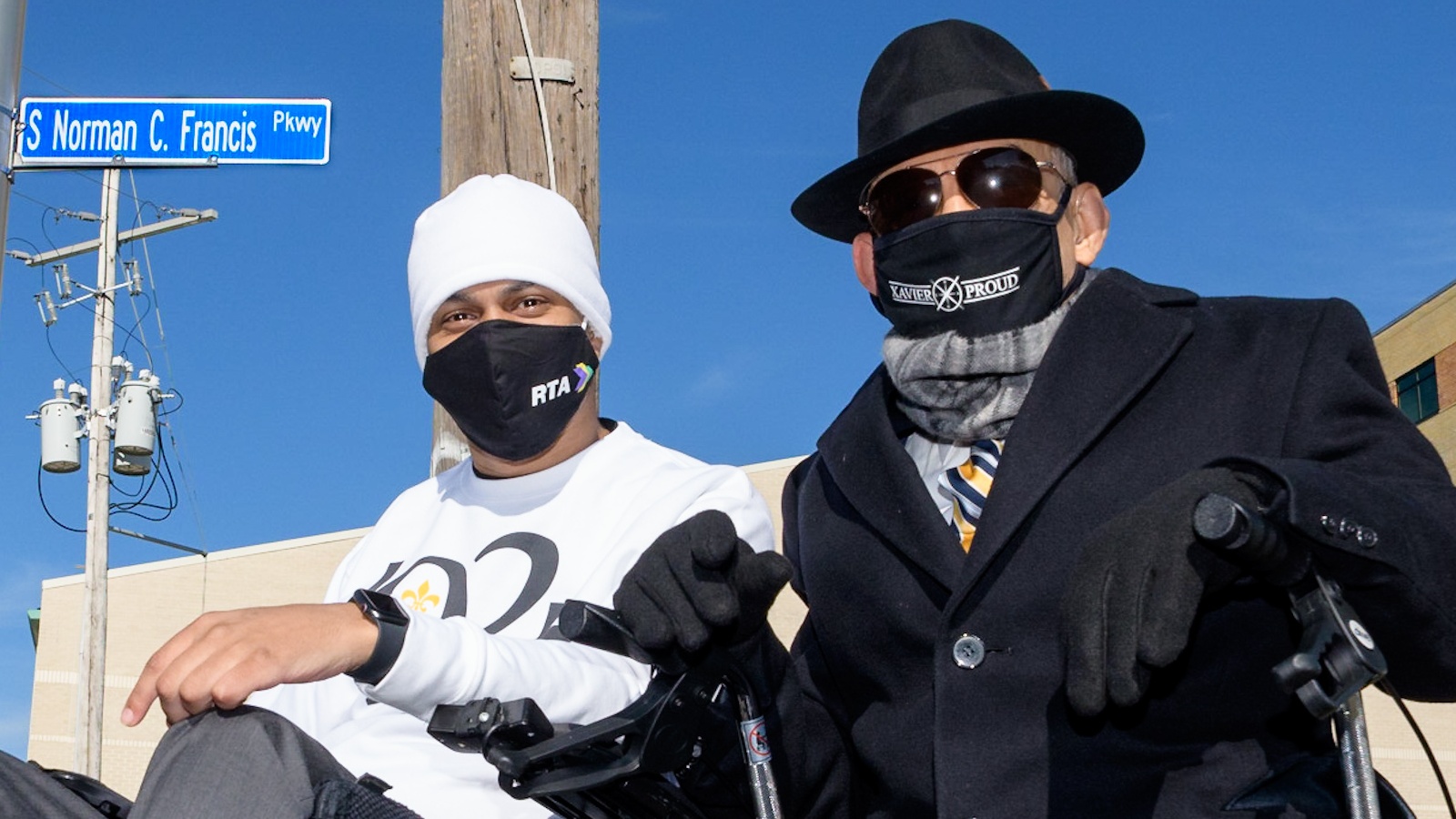A New Orleans street along the perimeter of Xavier University of Louisiana has officially been renamed after the university's president emeritus and longest-serving HBCU president, Norman C. Francis, J.D.
City and university officials joined together at the end of January to cut the ribbon on S. Norman C. Francis Parkway, which was previously named S. Jefferson Davis Parkway. The vote to rename the street after Francis began taking shape in the spring of 2020 as the nation continued to make major changes to take down celebrated remnants of the Confederacy.
In July 2015, then-Mayor Mitch Landrieu released a statement outlining the process to relocate the city's Confederate monuments. In the statement, Landrieu also proposed renaming Jefferson Davis Parkway to Norman C. Francis Parkway. A statue of Jefferson Davis was removed from the street in May 2017.
“It would be better for all our children, black and white, to see symbols in prominent places in our city that make them feel proud of their city and inspire them to greatness," Landrieu wrote. "We should do our part to remove these symbols of supremacy from places of reverence that no longer, if ever, reflect who we are. The moral arc of history bends as it usually does, towards justice. But it does not bend on its own. That is left to us.”
The removal of Confederate monuments prompted community members to reopen public desires for city street names to be changed. S. Jefferson Davis Parkway remained an early choice for the process given the egregious nature of it facing an HBCU coupled with the university having been founded by Saint Katherine Drexel, a nun who was canonized in 2000. An official petition was submitted to the New Orleans City Council in June 2020.
"It's time that New Orleans let the nation know for once and for all that it has stepped out of the shadow of the Confederacy," petition creator Mark Raymond Jr. wrote. "I'm calling on prominent New Orleans citizens like Drew Brees to help with this effort, so he can show by his actions that our streets should reflect the names of those who have done the most for our city."
Council vice president Helena Moreno favorably received the petition, calling it a "wonderful example of the community rising and getting results."
"This is a small, yet important step to act on now, with so much more major work that lies before us in ending systemic racism," Moreno said.
Landrieu later signed an opinion article in the city's newspaper along with other former city mayors Marc Morial, Sidney Barthelemy and Moon Landrieu, as well as current mayor Latoya Cantrell, who is a Xavier University alumna.
"It is our responsibility to lift up heroes who have brought us together and who exemplify the best America has to offer. As former mayors, we have each scanned our collective memories and cannot think of another person who has given more of his time, intellect, spirit and life to the city of New Orleans and its people than Dr. Norman C. Francis," the article read.
A month before the council reached its decision, Vice President Kamala Harris, who was serving in her former role as a U.S. senator, wrote a letter of support.
"Streets named after Confederate leaders celebrate men who fought for a divided America founded on racism and slavery," Harris wrote. "In contrast, streets named after Black role models who work to build up their communities honor the values of justice and equality while inspiring generations to come."
The city council unanimously voted in favor of the name change on Aug. 20, 2020, with the official renaming taking effect on Jan. 1, 2021, so as not to disturb the 2020 Census or elections.
“I am most grateful that the city of New Orleans has named a street in my honor, particularly one that borders Xavier University, an institution that I have called home for more than a half-century,” Francis told WWL TV. “St. Katharine Drexel and the Sisters of the Blessed Sacrament trusted me to serve Xavier and make it an integral part of this community. I share this acknowledgment with them and my Xavier colleagues. I am truly honored and humbled by this recognition.”
Francis, a 1952 graduate of the university, began serving in the administration in 1957 as its dean of men. He ascended the ranks eventually being named university president in 1968, a position he held until his retirement in 2015. He received the Presidential Medal of Freedom in 2006, in acknowledgment of his role as a highly-lauded university president, along with his service as chair of the Louisiana Recovery Authority after Hurricane Katrina ravished the city, including the campus of Xavier University which was shuttered for more than a full semester.
At the ribbon-cutting ceremony for the street, which was held on Jan. 28, Francis was joined by university officials, including current president Reynold Verret, Ph.D., former students and city officials, including Mayor Cantrell.
“It’s hard to hold back the tears of honoring a man who has ensured that not only Xavier is on a national stage but that countless African American men and women were educated under his leadership,” Cantrell said at the ceremony.
